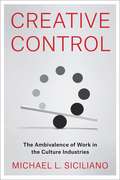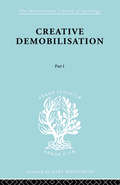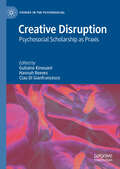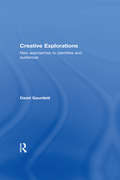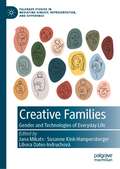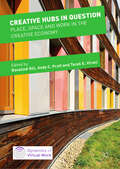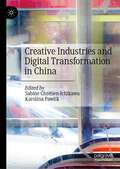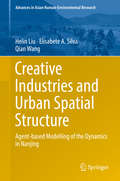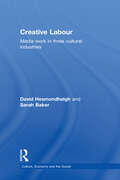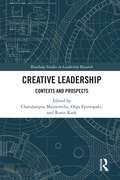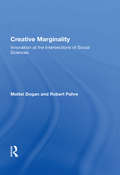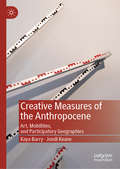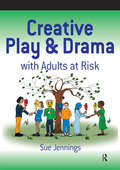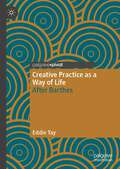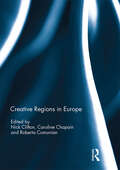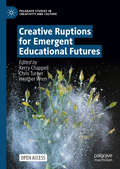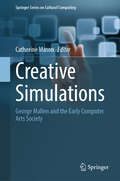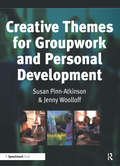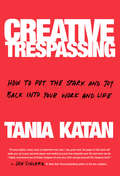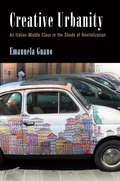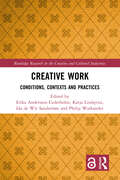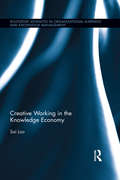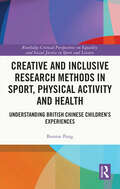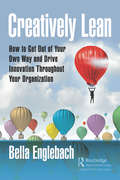- Table View
- List View
Creative Control: The Ambivalence of Work in the Culture Industries
by Michael L. SicilianoWorkers in cultural industries often say that the best part of their job is the opportunity for creativity. At the same time, profit-minded managers at both traditional firms and digital platforms exhort workers to “be creative.” Even as cultural fields hold out the prospect of meaningful employment, they are marked by heightened economic precarity. What does it mean to be creative under contemporary capitalism? And how does the ideology of creativity explain workers’ commitment to precarious jobs?Michael L. Siciliano draws on nearly two years of ethnographic research as a participant-observer in a Los Angeles music studio and a multichannel YouTube network to explore the contradictions of creative work. He details how such workplaces feature engaging, dynamic processes that enlist workers in organizational projects and secure their affective investment in ideas of creativity and innovation. Siciliano argues that performing creative labor entails a profound ambivalence: workers experience excitement and aesthetic engagement alongside precarity and alienation. Through close comparative analysis, he presents a theory of creative labor that accounts for the roles of embodiment, power, alienation, and technology in the contemporary workplace.Combining vivid ethnographic detail and keen sociological insight, Creative Control explains why “cool” jobs help us understand how workers can participate in their own exploitation.
Creative Demobilisation: Part 1 (International Library of Sociology)
by E.A. GutkindThis is Volume II in a series of eighteen on Public Policy, Welfare and Social Work. Originally published in 1998, part one of creative demobilisation looks at the principles of national planning. The book attempts to lay down principles of planning on a national scale. It is not concerned with the working out of details which belong rather to the sphere of regional and local planning. Planning has become the catchword of our age: not merely, one suspects, because it is a necessity inherent in our historical situation, but also because it offers for many people a welcome escape from the ambiguities of political action.
Creative Disruption: Psychosocial Scholarship as Praxis (Studies in the Psychosocial)
by Guilaine Kinouani Hannah Reeves Clau Di GianfrancescoThinking and doing through a diverse set of theories, methodologies and writing registers, this edited collection explores the potential of creative disruption as psychosocial praxis. Moments of disruption – planned and unplanned – are everywhere in the fragile terrain of society, from micro-level gestures of resistance and refusal at the local scale to globally disruptive phenomena such as climate and ecological breakdown and pandemics. The authors of this collection ask instead: how might the disruption we encounter open up junctures for creative and ethical psychosocial engagement? This collection introduces new and emerging voices in psychosocial scholarship from within and beyond academia and the clinic, which brings unique perspectives that have been historically discarded, marginalised or neglected within mainstream academic knowledge production. The contributors examine disruption as a catalyst for discomfort and discontent, drawing from black feminism, whiteness studies, theories of racialisation, queer theory, disability studies, psychoanalysis, postcolonial studies, and more. The authors explore questions of power, knowledge, memory, embodiment and the potential of multidisciplinary approaches in nurturing disruption.
Creative Explorations: New Approaches to Identities and Audiences
by David GauntlettHow do you picture identity? What happens when you ask individuals to make visual representations of their own identities, influences, and relationships? Drawing upon an array of disciplines from neuroscience to philosophy, and art to social theory, David Gauntlett explores the ways in which researchers can embrace people's everyday creativity in order to understand social experience. Seeking an alternative to traditional interviews and focus groups, he outlines studies in which people have been asked to make visual things – such as video, collage, and drawing – and then interpret them. This leads to an innovative project in which Gauntlett asked people to build metaphorical models of their identities in Lego. This creative reflective method provides insights into how individuals present themselves, understand their own life story, and connect with the social world. Creative Explorations is a lively and original discussion of identities, media influences, and creativity, which will be of interest to both students and academics.
Creative Families: Gender and Technologies of Everyday Life (Palgrave Studies in Mediating Kinship, Representation, and Difference)
by Libora Oates-Indruchová Jana Mikats Susanne Kink-HampersbergerThis edited collection brings together two strands of current discussions in gender research through the concept of creativity. First, it addresses creativity in the context of the family, by exploring changing and newly emergent family forms and ways of creating and maintaining intimate relationships. Creativity here is understood not as just “newness or originality,” but as that which, in the words of Eisler and Montouri (2007), “supports, nurtures, and actualizes life by increasing the number of choices open to individuals and communities.” One aim of this book, therefore, is to investigate the social, collaborative, and creative interactions in contemporary family and kin formations in Europe. Second, the volume examines how new media and technologies are entering and shaping everyday family lives. Technological transformations and adaptions have not only enabled the creation of new forms of families and ways of family living, but also challenged the established constellations of gender and family arrangements. The present volume addresses these issues from multiple perspectives and in different contexts, and explores the involvement of different actors. By problematizing the creativity of becoming and “doing” family and kinship, the authors acknowledge the increasing fluidity of gender identities, the evolving diversity of relationships, and the permeation of technology into daily life.
Creative Hubs in Question: Place, Space and Work in the Creative Economy (Dynamics of Virtual Work)
by Rosalind Gill Andy C. Pratt Tarek E. ViraniCreative hubs have become a cornerstone of economic and cultural policy with only the barest amount of discussion or scrutiny. This volume offers the first interrogation of creative hubs, with ground-breaking critical writing from a combination of established scholars and new voices. Looking across multiple sites trans-nationally, and combining theoretical and empirical reflections, it asks: what are creative hubs, why do they matter, and are they making the world a better place?Creative Hubs in Question discusses creative hubs in relation to debates about creative cities, co-working spaces and workers' co-operatives. Featuring case studies from Argentina to the Netherlands, and Nigeria to the UK, the contributions address how hubs are situated in relation to projects of equality and social justice, and whether and in what ways they change the experiences of the creatives who work in them. Drawing on a range of disciplinary perspectives including sociology, geography, economics, media and communications, culture and creative industries, critical policy studies, gender studies, race and ethnicity, and urban studies, this collection will be of interest to policy makers, academics, scholars, students and practitioners across these fields.
Creative Industries and Digital Transformation in China
by Sabine Chrétien-Ichikawa Karolina PawlikAs China gains momentum in economic terms, its technological transformation, cultural confidence, and creative influence also grow steadily. This book explores socio-cultural context, in which new trends, enabled by the power of digital technology, emerge. Focused on the urban context, in China's large cities like Shanghai, and through the lens of art, design, fashion, gaming, and media industries, this book highlights innovation processes in the making, as well as ongoing shifts in Chinese identities and narratives. This collaborative work written by European authors based in China offer new insights from within. Their shared, yet multi-faceted, engagement with China and its creative industries culminates in this book written for international scholars, students, and industry players.
Creative Industries and Urban Spatial Structure: Agent-based Modelling of the Dynamics in Nanjing (Advances in Asian Human-Environmental Research)
by Helin LiuThis book explores the dynamics of the interaction between the development of creative industries and urban land use. It is based on the case city of Nanjing, a metropolis representing the second tier of cities in China's urban system in the Yangtz River delta. This research adopts an interdisciplinary approach which integrates GIS, ABM, Questionnaire investigation and Interview.
Creative Labour: Media Work in Three Cultural Industries (CRESC)
by David Hesmondhalgh Sarah BakerWhat is it like to work in the media? Are media jobs more ‘creative’ than those in other sectors? To answer these questions, this book explores the creative industries, using a combination of original research and a synthesis of existing studies. Through its close analysis of key issues – such as tensions between commerce and creativity, the conditions and experiences of workers, alienation, autonomy, self-realization, emotional and affective labour, self-exploitation, and how possible it might be to produce ‘good work’ Creative Labour makes a major contribution to our understanding of the media, of work, and of social and cultural change. In addition, the book undertakes an extensive exploration of the creative industries, spanning numerous sectors including television, music and journalism. This book provides a comprehensive and accessible account of life in the creative industries in the twenty-first century. It is a major piece of research and a valuable study aid for both undergraduate and postgraduate students of subjects including business and management studies, sociology of work, sociology of culture, and media and communications.
Creative Leadership: Contexts and Prospects (Routledge Studies in Leadership Research)
by Ronit Kark Charalampos Mainemelis Olga EpitropakiThere has never been a better time to study, practice, and experience creative leadership. In the fluid and turbulent economic and social environments of the 21st century, creative leadership has become a cardinal force in the creation and evolution of adaptive organizations. In the last two decades, organizational science has witnessed a rapid increase in the number of studies on the nature, skills, and processes of creative leadership. The resulting accumulated body of knowledge has remained for many years dispersed and fragmented across multiple strands of organizational research. This volume seeks to foster the cross-fertilization of scientific knowledge and insight by bringing together authoritative contributions from leading scholars whose work is located in different strands of creative leadership research. Creative Leadership: Contexts and Prospects builds upon a recently introduced multi-context framework that integrates metatheoretically three conceptualizations of creative leadership found in the extant literature: Facilitating employee creativity; Directing the materialization of a leader’s creative vision; and Integrating heterogeneous creative contributions. These three conceptualizations reflect essential differences in the enactment of creative leadership across various collaborative contexts of creative work, and they underlie the intellectual efforts of different research strands. The collection of chapters in Creative Leadership: Contexts and Prospects offers the latest thinking on creative leadership in facilitative, directive, and integrative contexts, and a stimulating set of ideas for crafting the next generation of nuanced theories and empirical studies in the field.
Creative Marginality: Innovation At The Intersections Of Social Sciences
by Mattei DoganTracing the nine formal social science disciplines - political science, sociology, economics, history, anthropology, philosophy, geography, psychology, and linguistics - through their cycles of growth, specialization, fragmentation and hybridization, Dogan and Pahre reject the notion of catch-all "interdisciplinary" research. They set out to demon
Creative Margins
by Alison L. BainSuburbs can be incubators of creativity: innovative and complex, but all too often underappreciated. In Creative Margins, Alison L. Bain documents the unique role of Canadian artists and cultural workers in suburban place-formation and dismantles mischaracterizations of suburbs as cultural wastelands.Creative Margins interweaves stories of the challenges and opportunities presented by the creation of culture in suburbs, focusing on Etobicoke and Mississauga outside Toronto, and Surrey and North Vancouver outside Vancouver. The book investigates whether the creative process unfolds differently for suburban and urban cultural workers, as well as how this process is affected by the presence or absence of cultural infrastructure and planning initiatives.Bain shows how suburban culture can enhance a city-region's vitality and sustainability. This book firmly debunks the myth of culture as a solely urban phenomenon and demonstrates the social and economic merits of investing in suburban art and culture.
Creative Measures of the Anthropocene: Art, Mobilities, and Participatory Geographies
by Kaya Barry Jondi KeaneThis book proposes that creative and participatory modes of measuring, knowing, and moving in the world are needed for coming to grips with the Anthropocene epoch. It interrogates how creative, affective and experiential encounters that traverse the local and the global, as well as the mundane and the everyday, can offer new perspectives on the challenges that lay ahead. This book considers the role of the arts in exploring geographical concerns and increasing human mobility. In doing so, it offers ways to counteract the unstable, shifting and disorienting impacts and debates surrounding human activity and the Anthropocene. The authors bring together perspectives from mobilities, creative arts, cultural geography, philosophy and humanities in an innovative exploration of how creative forms of measurement can assist in reconfiguring individual and collective action.
Creative Play and Drama with Adults at Risk
by Sue JenningsThis hands-on manual offers a clear introduction to play and drama work for professionals working with adults at risk. Many adults feel nervous about drama and think that play is childish. Sue Jennings shows that by participating in play and drama people can make a difference to how they feel about themselves and the world around them. This book is suitable for professionals working with adults who are vulnerable for a number of different reasons: those who have addictions such as eating disorders, drug and alcohol abuse or a history of violent relationships; adults with mental ill health; individuals and families with behavioural difficulties; people in forensic settings; those with multiple disabilities; learning impaired adults; people with strokes and other physical impairment often as a result of accidental injury. Material is chosen sensitively to enable confidence and creativity building, and the development of communication skills. Photocopiable worksheets offer the professional activities that will encourage trust and collaboration; foster independence and choice, maximise people's learning potential and stimulate everyone's imagination and creativity. Ideas are given for improvisation and movement as well as masks and myths. Cross-cultural perspectives are discussed together with boundaries for clinical groups. The importance of the healing potential of artistic expression is addressed throughout.
Creative Practice as a Way of Life: After Barthes (Palgrave Studies in Creativity and Culture)
by Eddie TayThis book combines autoethnographic reflections, poetry, and photography with the aim to bridge the gap between creative practice and scholarly research. Drawing on an innovative combination of different forms of knowledge, creative writing and street photographs are presented as means to reflect on the development of knowledge and self-knowledge through a thought-provoking dialogue with Roland Barthes’ post-structuralist work. What does it mean to be a creative practitioner in a world traversed by values of capitalism and artificial intelligence? What does it mean to teach creative practices in such an environment?The urban landscape of Singapore, with the Jewel Changi mall, the Universal Studios, and Little India in the background, is the stage where the capitalist demands of modern city life grapple with the solitary act of writing poetry and taking photographs through the personal experience of the author. Capitalist realism and depression realism entwine with Barthes' notion of vita nova in a mesmerizing phantasmagoria that drags the reader to the bowels and secret pleasures of the creative process.
Creative Regions in Europe
by Caroline Chapain Roberta Comunian Nick CliftonCreative and cultural industries, broadly defined, are now considered by many policy makers across Europe at the heart of their national innovation and economic development agenda. Similarly, many European cities and regions have adopted policies to support and develop these industries and their local support infrastructures. However this policy-making agenda implicitly incorporates (and indeed often conflates) elements of cultural and creative industries, the creative class and so on, which are typically employed without due consideration of context. Thus a better understanding is required. To this end, this book features eight research papers, split evenly with regard to geographical focus between the UK and continental Europe (the latter covering Spain, Germany, France, Luxemburg and Belgium individually and in combination). There is also a similar division in terms of those focusing primarily on the policy level (the chapters of Clifton and Macaulay, Mould and Comunian, Pareja-Eastaway and Pradel i Miquel, Perrin) and those of the individual creative actor (the chapters of Alfken et al, Bennett et al, Wedemeier and Brown). This book was previously published as a special issue of European Planning Studies.
Creative Ruptions for Emergent Educational Futures (Palgrave Studies in Creativity and Culture)
by Chris Turner Kerry Chappell Heather WrenThis open access book aims to show how creative ruptions – disturbances or commotions - can lead to the emergence of ethical, care-ful educational futures. Grounded in empirical and theoretical research undertaken from posthuman, decolonial, new materialist and feminist perspectives, this edited volume questions historical and current assumptions as to how education is structured and enacted, and provides examples and tools illustrating how to create and work with creative ruptions. Under the guidance of an experienced editorial team, the authors demonstrate how creative ruptions can respond to various wicked problems through the design and enactment of transformative pedagogies and accompanying research. Including consideration of how we can grow our emotional repertoires from anxiety to include hope and courage, the book explores how creativity might expand the horizons of personal, social and political possibility that take shape within – and ultimately determine – education and its futures.Offering theoretically driven and practically grounded transdisciplinary examples of alternative educational futures, this volume is an ideal reading for those interested in the intersecting fields of Possibilities Studies in Education, Creativity in Education, Educational Futures, Pedagogy, and related disciplines.
Creative Simulations: George Mallen and the Early Computer Arts Society (Springer Series on Cultural Computing)
by Catherine MasonThis book is centred on the practitioner-led Computer Arts Society founded in 1969 and formed to address creative computation in all the arts – performance, poetry, text, sound, sculpture and graphics. The objectives and achievements of the Computer Arts Society are presented as realised through their members and exhibitions to the mid-1970s. The Society’s co-founder is Dr George Mallen, a pioneer of cybernetic systems and cultural applications of computing. Creative Simulations contains new research including Mallen’s early work with cybernetician Gordon Pask, whose concepts of interdisciplinarity were influential on the ground-breaking Ecogame (1970). Led by Mallen, Ecogame was a collaborative Computer Arts Society project, an early embodiment of computer technology into art and the first multi-media interactive gaming system in the UK. Pask’s influence in Mallen’s subsequent role at the Royal College of Art where he instigated the first computerlab facilities for artists, is examined. A recently discovered lecture given by Mallen is transcribed, along with reproduction of historic texts by Stephen Willats and John Lansdown (two of his colleagues), which add context to this history of interdisciplinary artistic innovation in the digital realm. Illustrations include art works, ephemera, exhibition posters and installations, preparatory drawings, computing equipment and associated flow charts and diagrams, many appearing here in print for the first time.
Creative Themes for Groupwork and Personal Development
by Susan Pinn-Atkinson Jenny WoolloffBased around thirty themes, this practical resource provides flexible and adaptable ideas for groupwork sessions. The themes in this book: can be adapted and developed to match the exact needs and interests of the participants; aim to generate and inspire group facilitators to think broadly and creatively, and to feel confident in using the culture and history of their geographical area to enrich the work they do with participants; enable participants to explore, develop and reflect upon their hidden, unidentified or unacknowledged strengths, transferable skills and knowledge; have a variety of alternative or additional ideas, and many are accompanied by worksheets; and include colour, television, soaps, touch, mirrors, maps, weather and many more.
Creative Trespassing: How to Put the Spark and Joy Back into Your Work and Life
by Tania Katan"At once playful, smart, easy to implement and, dare I say, punk rock, the pages of this book will wake you up to your personal power and remind you just how enjoyable your life, and work, can be. I highly recommend you let Katan trespass all over your sitch and get yourself this fabulous book." - Jen Sincero, #1 New York Times bestselling author of You are a Badass and You are a Badass at Making MoneyCreative disruptor, inspirational speaker, and co-creator of the internationally viral campaign #ItWasNeverADress shows you how to put the spark back into your work and life."You don't have to turn into a corporate drone to kick ass in the working world," says Tania Katan. After more than ten years of smuggling creativity into the business sector without getting busted, Katan is here to tell you that any task or pursuit can be a creative one. You just need to be willing to defy conformity and be ready to conjure imagination anywhere, at any time. If you're feeling stuck in a dullsville job, a windowless cubicle, or an ill-fitting polyester work shirt, chin up! Katan has been there, too, and she's lived to tell the story. How? By choosing to stand out rather than fit in, to find her light, and to bask in it with all of her quirks and flaws. "The moment you choose to let the world see the real you--messy, imperfect, warts and all," she says, "is the moment you choose to shine too."Whether you're an entrepreneur seeking new ways to innovate, a newbie trying to spice up routine entry-level work, a free spirit with a rich creative life outside the office looking to bring more of that magic into your job, or just someone who occasionally feels the urge to scream "Why does it say paper jam when there is no paper jam?!!," Katan will show you how to transform monotony into novelty and become more energized in your work and in the world.Peppered with stories of her own shenanigans--from organizing a wrestling match in the middle of an art museum to staging a corporate culture intervention via post-its--and lessons from the rule-breaking exploits of artists, change-makers, and totally legit business leaders alike, this book is a rollicking, uninhibited guide to using creativity as fuel for a freer and more joyful life.
Creative Urbanity: An Italian Middle Class in the Shade of Revitalization (Contemporary Ethnography)
by Emanuela GuanoIn the 1970s, the city of Genoa in northern Italy was suffering the economic decline and the despondency common to industrial centers of the Western world at that time. Deindustrialization made Genoa a bleak, dangerous, angry city, where the unemployment rate rose alongside increasing political violence and crime and led to a massive population loss as residents fled to find jobs and a safer life elsewhere. But by the 1990s a revitalization was under way. Many Genoese came to believe their city was poised for a renaissance as a cultural tourism destination and again began to appreciate the sensory, aesthetic, and cultural facets of Genoa, refining practices of a cultured urbanity that had long been missing. Some of those people—educated, middle class—seeking to escape intellectual unemployment, transformed urbanity into a source of income, becoming purveyors of symbolic goods and cultural services, as walking tour guides, street antiques dealers, artisans, festival organizers, small business owners, and more, thereby burnishing Genoa's image as a city of culture and contributing to its continued revival. Based on more than a decade of ethnographic research, Creative Urbanity argues for an understanding of contemporary cities through an analysis of urban life that refuses the prevailing scholarly condemnation of urban lifestyles and consumption, even as it casts a fresh light on a social group often neglected by anthropologists. The creative urbanites profiled by Emanuela Guano are members of a struggling middle class who, unwilling or unable to leave Genoa, are attempting to come to terms with the loss of stable white-collar jobs that accompanied the economic and demographic crisis that began in the 1970s by finding creative ways to make do with whatever they have.
Creative Work: Conditions, Contexts and Practices (Routledge Research in the Creative and Cultural Industries)
by Erika Andersson Cederholm Katja Lindqvist de Wit Sandström, Ida Philip WarkanderHow do creative workers work? This book brings together insights from a range of relevant disciplines to help answer this significant research question.Featuring case studies from the European context, contributors tap into the experiences and practices from creative workers, demonstrating their attempts to navigate a changing environment which affects spaces, identities, and professional roles. As cross-disciplinary re-thinking of work, labour processes and management practices in the creative and cultural industries, the book offers perspectives on the importance of highlighting creative work as a phenomenon and practice beyond a particular industry, market, or public sector. Providing an opportunity to expand our conception of what creative work is, the book draws on studies of a range of activities, practices and sectors that are usually included in the cultural and creative industries as well as ones that are more untraditional.The result is a volume that will interest students, practictioners, and scholars with an interest in the creative industries.The Open Access version of this book, available at www.taylorfrancis.com, has been made available under a Creative Commons Attribution-Non Commercial-No Derivatives (CC-BY-NC-ND) 4.0 license.
Creative Working in the Knowledge Economy (Routledge Advances in Organizational Learning and Knowledge Management)
by Sai LooThere is a growing interest in the knowledge economy, and the new types of job and ways of working associated with it. This book analyses how a particular group – creative knowledge workers – carry out their jobs and learn within it. Using empirical research from advertising and software development in Europe, Singapore and Japan, it develops a new conceptual framework to analyse the complexities of creative knowledge work. Focussing uniquely on the human element of working in the knowledge economy, it explores the real world of how people work in this emerging phenomenon and examines relationships between knowledge and creative dimensions to provide new frameworks for learning and working. It offers critical insights into how these workers apply their creative knowledge work capacities towards the production of innovative products and services, as well as using their creative abilities and knowledge to fashion both digital and tangible goods in the knowledge economy. Adding significantly to the on-going debate around knowledge work and creativity, this comprehensive examination will be of interest to researchers and educators in organisational learning, management and HRM and to anyone involved in devising ways to develop and support workers in lifelong and flexible creative work practices.
Creative and Inclusive Research Methods in Sport, Physical Activity and Health: Understanding British Chinese Children’s Experiences (Routledge Critical Perspectives on Equality and Social Justice in Sport and Leisure)
by Bonnie PangThis book demonstrates how creative research methods can be used to better understand the experiences of children, particularly in the context of sport, physical activity and health. Extending recent developments in arts-based methods, mobile digital ethnographic methods, participatory visual methods and autoethnography in research with children, the book focuses on British Chinese children – an often-neglected group in research studies – providing new perspectives on diversity and inclusion, innovative research methods and the Chinese diaspora. The book draws on concepts from health and physical education, sport, sociology, and psycho-social studies to shed new light on social dynamics, cultural diversities and contextual changes in British Chinese children’s health-related experiences. It shows how globalisation and international mobility has complicated diversity and difference in the Chinese diaspora, and how creative research methods and reflexivity can be powerful tools for unlocking our understanding of children’s everyday lives. This is fascinating and useful reading for any researcher or advanced student with an interest in innovative research methods, sport, physical activity, health, migration and diaspora studies, childhood and youth studies.
Creatively Lean: How to Get Out of Your Own Way and Drive Innovation Throughout Your Organization
by Bella EnglebachYou know your organization needs creativity. Your improvement program is effective, but you’re not making the real breakthroughs you were anticipating. Your employees struggle to create innovative change, while you struggle with how to help them. Your lean advisors talk about a "different way of thinking," but how do you get there? In this unique and uplifting book, Bella Englebach shows how the principles and tools of Creative Problem Solving drive deep and creative thinking when used with lean problem-solving approaches. In this book, you will learn how you can encourage creative thinking, how to support the creative thinking of your peers and employees, and how to help everyone in your organization develop high-value insights to advance strategy. Amid a lean deployment, Beth, a mid-level manager, is shocked to find that she has been assigned not one, but two coaches. Linda is her lean thinking coach, Carlo, a coach in Creative Problem Solving. As Beth faces serious business challenges, Linda and Carlo guide her to think deeply and creatively to solve problems and to become a strong lean thinking leader. You will follow her journey and see how Creative Problem Solving tools enhance lean thinking at every step. Creatively Lean is your roadmap to going beyond as a lean thinker and leader. Creatively Lean is more than a business novel. Appendices provide insight into the history of Creative Problem Solving, tools for divergent and convergent thinking, and tips on how to use Creative Problem Solving with A3 thinking. Use the book club questions to spur group discussion or for self-study.
